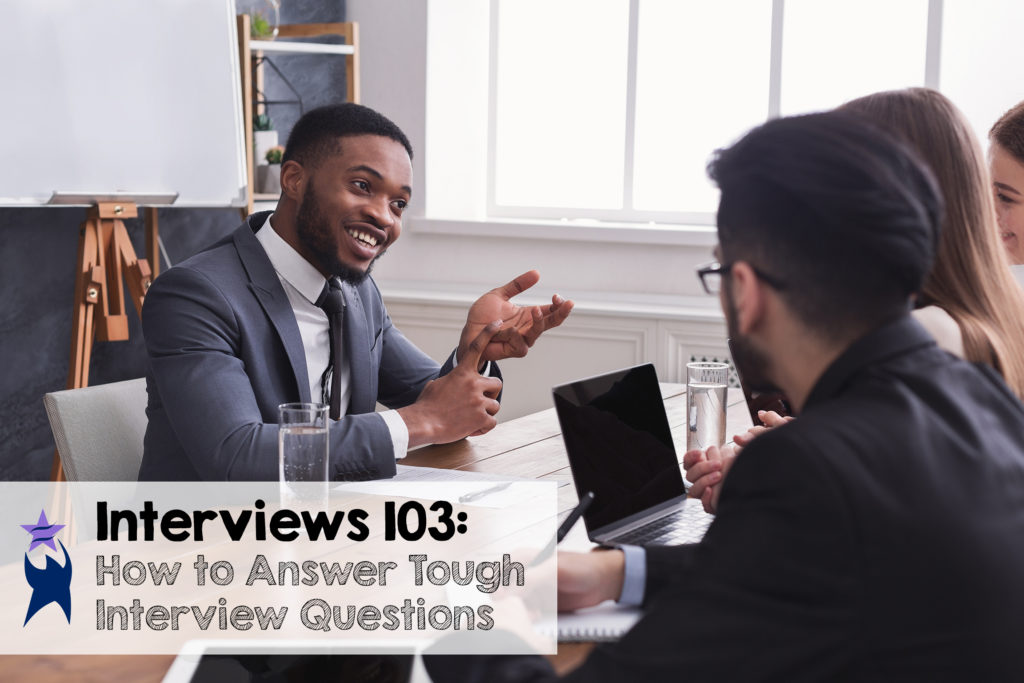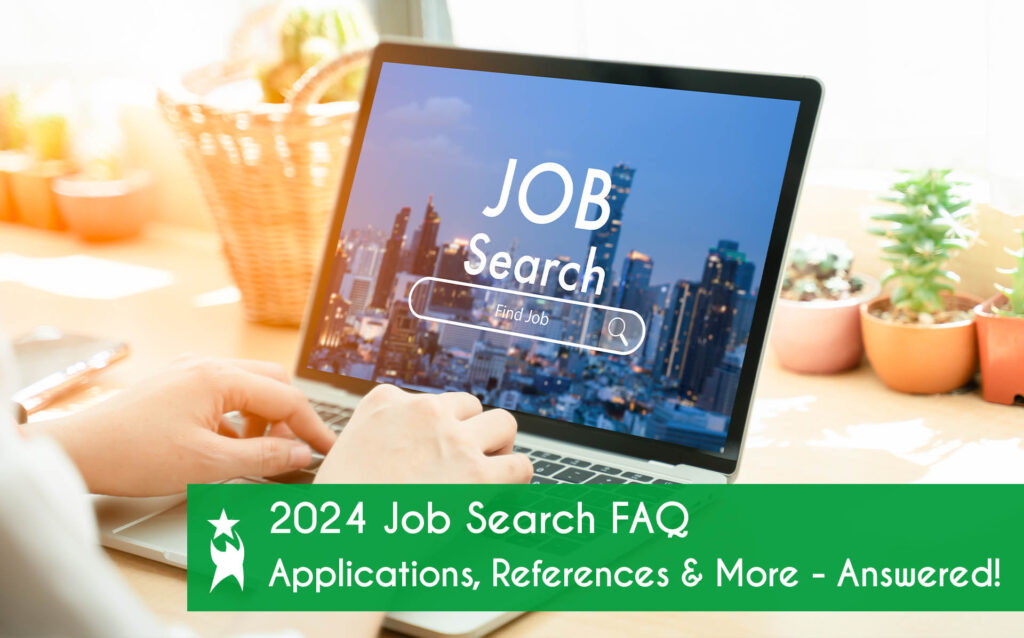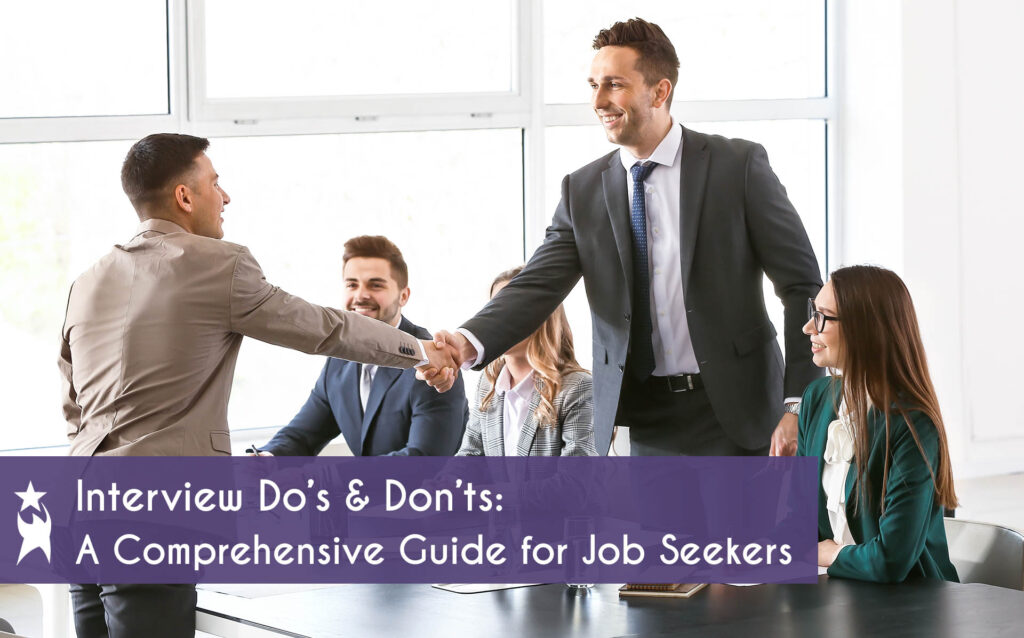August 24, 2021
Nobody wants to get caught off guard by tough interview questions. Whether you’re a seasoned job seeker or you’re headed off to your first interview, you probably already know some of the toughest interview questions are also some of the most common. But knowing these questions are likely to come up might not be enough to help you figure out how to answer them. With this in mind, we’ll go through some of the most common questions people stumble over, and give our best advice for tackling these tough interview questions.
Q: How should I answer interview questions about my weaknesses?
Jason
My general advice on this one is be weary of the standard answers. Anyone can use a Google search and ask ‘how do I answer interview questions about my weaknesses?’ Instead, try to really have a thought-provoking answer, and maybe even think of it on the fly for lack of a better term. And the reason I say that is often with the weakness question they’re less concerned with what your weaknesses are, and they’re trying to see how you’re gonna handle the question.
So I’ll use one of my things here, often when I’ve been asked that interview question, I’ve said there are times in my career when I have shot the messenger. In other words, somebody gives me bad news, and I get upset at the person giving me bad news. Obviously that is something I wanna do a better job at. So then I say it’s something I work on, it’s something I deal with. It is something that I’m continually working on. So that might help.

Again, going back to not giving the cliché answer. Never answer the question with something along the lines of I work too hard, or I’m too much of a perfectionist. Or there’s a litany of other things out there that people say. You definitely don’t wanna do those.
Chrissy
Above all, be honest. They’re going to see through you pretty fast if you try to avoid the question or give generic answers to this one. Instead, I think this one really takes some self-reflection ahead of time to identify the things you really aren’t awesome at. But more than that, it involves coming up with some strategies for lessening the impact of your weaknesses. If you can do that, then what you’re ultimately showing the hiring manager is that you’re the type of candidate who won’t shy away from doing some self-reflection and making some changes if that’s what it takes to get the job done. What you certainly don’t wanna do is show them you’re the type of candidate who will hide information and avoid conversations you don’t like. That never benefits the company, and has a lot of potential to harm a company.

For me personally, I have literally the worst memory, and that’s how I answer interview questions like this. It’s something I know about myself, so I have come up with a lot of strategies to handle it. For example, I set a lot of reminders, and I keep logs for tasks I need to do over an extended period of time, to remind myself what’s been done and what hasn’t. I also make To Do lists so I won’t forget to do something I’ve said I’ll do. In short, I don’t let my bad memory define me. Instead I’ve developed some strategies that are really effective in helping me overcome that weakness. And at the end of the day, that sounds a lot better to a hiring manager than the candidate who’s unwilling to admit they have any weaknesses.
Q: I left my last job for a negative reason. How should I talk about that?
Jason
Good question here! The best way I can answer that question is don’t lie. I wouldn’t lie. Instead, look for a good reason for why you’re no longer with that company. Bad things happen to good people. It happens all the time, whether you were laid off, or you didn’t mesh with your manager or the company. Those things happen.
If you left for a negative reason, then be able to explain what you learned from it. For example, If you got fired from a job for a lack of performance or because you made a mistake, then how are you gonna fix it in the future? Be able to clarify how you’re gonna do better the next time. That’s the best way I can put it.

Obviously, things have happened to people. For example, I had a quality manager once walk out the door on me. Just flat out said he got mad at the company and just said “I’m done.” And, I’m sure he didn’t present it that way when he was in his next interviews. I’m sure that the conversation went more along the lines of: “Listen my values and the company’s values didn’t match, and we decided to part ways. I need to understand that and do my homework better in the future.”
These things happen. Again, have a story behind it and explain what you’re going to do better the next time. That would be my recommendation.
Chrissy
How you tackle this one might depend on what that negative reason is. For example, if you left because your boss was an overbearing jerk and you couldn’t handle the micromanaging anymore, then you should probably find a diplomatic way of saying that, and leave the details out. Instead, talk about how you realized you just weren’t a good fit with the culture and you’re looking for opportunities more in line with your goals.
However, If you were fired because you showed up late and missed a lot of days of work, then that’s a totally different conversation. In that case, you should be honest about the fact that you had some attendance issues, and try to focus the conversation on what you’re doing in your personal life to solve that problem. But you’ll need to give some real details here about what has changed, and be convincing about committing to showing up on time every day, going forward. For example, it’s not enough to just say “oh, but I promise I that won’t happen at this job.” You should be prepared to give a little insight into why you had so much trouble maintaining your schedule. And then give some specific details about changes you’ve made that allow you to commit to your work schedule this time around.
Q: How do you answer interview questions about where you see yourself in 5 years?
Chrissy
I hate answering this interview question! I mean, if someone had asked me 5 years ago where I’d like to be, I’m not convinced I would have said I want to be a Marketing Manager! But you know what? I really love being a Marketing Manager! With that said, I can imagine some of the skills I might have talked about developing 5 years ago would have been right in line with the things I’m doing now.
I think interview questions like this one are designed to uncover a couple things that might help you figure out how to answer it. First, you can get a pretty good idea about a candidate’s level of interest based on how they answer. For example, if they don’t have any clue what they want to be doing in 5 years, or give an answer totally unrelated to job, then it might not be a great fit.
Second, you can tell something about the person’s ambition with interview questions like this. In particular, are they expressing some interest in continuing to learn and grow? Or do they seem like they just want to come in and be a cog in the machine to get a paycheck and go home? Remember, most companies are looking for a person who wants to learn and grow, and ultimately become a more knowledgeable asset for the company.

In short, I would recommend answering this by talking about the skills you’d like to develop over the next few years, rather than what job title you’re aspiring to have. And by focusing on specific things you’re really interested in learning, you’re naturally going to show off some enthusiasm for the position you’re interviewing for; assuming those goals match the industry.
Jason
I’m gonna tell you pretty much every manager is gonna ask this interview question in some way, shape or form. It always comes up, but what they want to know is whether or not you’re content just doing what you’re doing. In our culture they wanna see people who are making strides in their career. They wanna see people who are going for the next thing.
So, when you get interview questions like this, if you’re working at the lower lines, come in and say: ‘hey, you know I expect to expand my skill set, and my knowledge base, and maybe I’ll make supervisor. I’m not 100% certain what the future has in store.’ But make sure you’re showing that you want to make progress in your career. And again, supervision isn’t for everybody, and you don’t have to go in and say you wanna be a supervisor. But, maybe you wanna be a knowledge worker. Maybe you wanna move into the office. Or maybe you wanna go forward in a different direction. But, try to show that you have career aspirations in mind, and you’ll answer this question just fine.
Q: Do I need to ask questions when they ask if I have any questions?
Jason
This is one of my personal favorite interview questions, and one that I always struggle with in my own interviews! They will ask at some point: do you have any questions for me? And the common advice is to always have questions available. In particular, try to talk about how you’re a fit within the the company.
For example, I tend to turn interviews into very interactive sessions, so I’m asking questions as we go along. But, one of the things I always try to make sure of is that I’ve got that one last question that I can put into play. And often, you can try to make it personal. I suggest trying to show that you care what the hiring manager is thinking, and the best way to do that is to ask questions like ‘what is your future vision of this position? How do you see this position growing? How do you see me growing within this position?’ And you’ll be shocked at the answers that you’ll get on that. It’ll become interactive, and it’ll actually become a better conversation if you answer it that way.
But again, at the end of the day, have a question. Have a couple of questions if you can. In this world of Zoom interviews, I often have something typed up on a Word document on a monitor somewhere, so I can answer the question if asked.

Chrissy
I struggle with this one too! I always try to prepare some questions ahead of time, and then I sometimes I find that all my questions have been answered by the time this comes up! So I really like Jason’s strategy on this one of intentionally holding at least one question for the end.
One question that I try to ask at the end of the interview is about what a typical day in this role would be like. I interviewed for a position once where it was kind of unclear whether the person would be out in the field interacting with clients or not. I was really in love with the mission of the job, so I didn’t really mind either way, but was curious, and that turned out to be a a really useful conversation.

We’ll be back soon with tips for avoiding red flag behaviors in interviews! We’re always happy to answer questions from our readers, so send in your best questions!
Check out our other blog posts for more useful tips and tricks!









